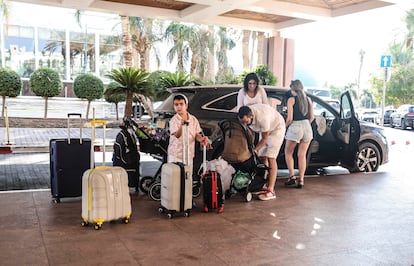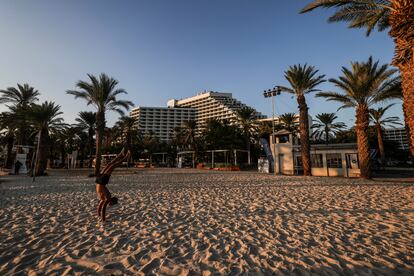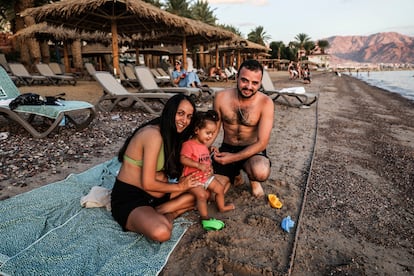The Red Sea paradise for the 60,000 Israelis forced to flee Hamas war
The Israeli government has financed the mass evacuation of civilians living on the border of Gaza and Lebanon. The residents have been moved to the tourist city of Eliat, where hotel occupancy is close to 100%

“We will spend months here. Only God knows when we will return home, to the Netiv Haashara kibbutz [cooperative farm], right on the border with northern Gaza,” says Yair Shtoa, as he leans on a sun lounger at the pool of the Royal Garden hotel in Eilat, a tourist city on the Israeli coast of the Red Sea. The 48-year-old truck driver says he is fed up with living in a five-star hotel by the beach: “We want to return as soon as possible.” The Israeli government is paying around €200 ($210) per day per adult for this accommodation and full board. Shtoa, meanwhile, continues to receive his full salary.
More than 60,000 Israelis displaced by the Hamas war from border areas of Gaza and Lebanon have been relocated to Eilat, a city sandwiched between Egypt and Jordan, at the bottom of the Gulf of Aqaba. Like many of them, Shtoa had to flee with his family to shelters on Tuesday morning, when a suicide drone from Iranian-allied Houthi rebels approached Eliat. It was shot down by Israel’s air defense systems, but the scare has upturned the evacuees’ forced vacation.
Almost a third of the 200,000 Israelis evacuated from the front lines of the conflict have ended up on the beaches of Eilat, a popular resort town that has seen its population double since the Israel declared war on Hamas three weeks ago. They are refugees in flip-flops, shorts and sarongs, without the misery and desperation that marks the hundreds of thousands of internally displaced Palestinians, as seen in images from southern Gaza. They look nothing alike, nor do they receive anywhere near the same assistance. But the sense of being uprooted from home is similar.
Eil Michosky’s hands haven’t stopped trembling since October 7, when the Izz al-Din al-Qassam Brigades — the armed wing of Hamas — broke into Israeli territory, killing 1,400 civilians and kidnapping another 200. The 42-year-old construction contractor is receiving psychological help in Eliat for post-traumatic stress. “On October 7, I was near the Yad Mordechai kibbutz, close to the wall with Gaza, when news of the Hamas attack arrived,” he says by the pool, where he sits with his wife, daughter and three Pomeranian dogs. “I went to the kibbutz when the first soldiers had been deployed, I grabbed the gun of a Hamas terrorist who had been killed and started shooting at those who were still there. I did things that I would never have imagined,” he says somberly.

The calm of Eliat, with its soaring hotels and duty-free shopping centers, has been disturbed by the flood of displaced people. Tuesday’s attempted drone attack is a reminder that, despite being almost 190 miles south of Gaza, the threats of the conflict in the Middle East are never far away.
Hotels at full capacity
“Hotels are making money, despite having lowered prices, but hotels are almost at full capacity. There are hardly any places available among our 1,400 rooms,” SAYS Alex Remitz, 41, the head of security at the Royal Garden, who carries a gun as he stands by the pool.
“The government without question covers the cost for the residents in the areas closest to Gaza or in Kyriat Shmona [near the Lebanese border],” adds the hotel manager, who says that civilians fleeing areas less close to the conflict, such as Ashkelon, are offered a reduced rate of 650 shekels ($160) per night.

The hotels are full, but the entertainment venues, shops and beaches are half empty. Most of the displaced Israeli wander around the luxurious hotels as if trying to recognize a strange terrain. Many of them left with almost nothing when they were evacuated from the kibbutzim and towns near the Gaza Strip. This is the case of Gabriel Shleicher, sales manager of a medical equipment firm, 62, and his wife Debora, 63, a clinic administrator in the kibbutz Be’eri, which was decimated in the Hamas attack. Both have been living near the Gaza border for 41 years, after emigrating from Argentina.
“Fortunately, it was the Sabbath, and we were at our house in kibbutz Nirim [15 kilometers south of Be’eri, on the eastern border of the Gaza]. Almost all my friends and many colleagues from the clinic died there,” she remembers, still in shock. She locked herself in the safe room of her house while Hamas militiamen roamed her garden.
As Israel’s southernmost point, Eilat seemed the safest place to transfer civilians evacuated due to the war. But a week ago, Hamas claimed to have fired a long-range rocket in the direction of the Red Sea resort city. The military did not confirm the launch. Eilat remains a paradise with luxury hotels and crystal clear cobalt blue waters, ideal for scuba diving. For now, tent camps have not had to be set up to accommodate the displaced, as happened in some parts of the center of the country. But he wail of anti-aircraft alarms made it clear on Tuesday morning that there is no place to be safe in a war.
On the beach in Eilat, Zira Sabet, a 23-year-old English teacher, was bathing at sunset in a sandy area with her son Adel, just over a year old. She is heavily pregnant and set to give birth in November. Her plan was to travel to be with mother, who lives in a kibbutz near the north of Gaza, but she fears she won’t be able to go. “I don’t want my baby to be born here. This is like a refugee camp with waves and sand. It’s like being in exile,” she says, while the sun calmly sets between the hills of Sinai.
Sign up for our weekly newsletter to get more English-language news coverage from EL PAÍS USA Edition
Tu suscripción se está usando en otro dispositivo
¿Quieres añadir otro usuario a tu suscripción?
Si continúas leyendo en este dispositivo, no se podrá leer en el otro.
FlechaTu suscripción se está usando en otro dispositivo y solo puedes acceder a EL PAÍS desde un dispositivo a la vez.
Si quieres compartir tu cuenta, cambia tu suscripción a la modalidad Premium, así podrás añadir otro usuario. Cada uno accederá con su propia cuenta de email, lo que os permitirá personalizar vuestra experiencia en EL PAÍS.
¿Tienes una suscripción de empresa? Accede aquí para contratar más cuentas.
En el caso de no saber quién está usando tu cuenta, te recomendamos cambiar tu contraseña aquí.
Si decides continuar compartiendo tu cuenta, este mensaje se mostrará en tu dispositivo y en el de la otra persona que está usando tu cuenta de forma indefinida, afectando a tu experiencia de lectura. Puedes consultar aquí los términos y condiciones de la suscripción digital.









































